7 books about Bond, Bruce
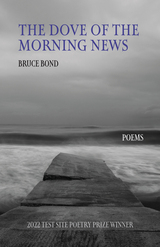
The Dove of the Morning News
Poems
Bruce Bond
University of Nevada Press, 2024
In poems both personal and historical, The Dove of the Morning News explores conceptions of collectivity, inflected by each psyche, as a force of both connection and division. In its look at tribalism and systemic cruelty as rooted in shame, dread, and insecurity, the book seeks a better understanding of how power needs, spurred by communities of hatred, weaponize the brain’s tendencies to think in animated figures, caricatures, erasures, or, as in the book’s mediation on vellum, texts written across the bodies of others.
As a lens into contemporary life, the title sequence interrogates the vision of Pierre Teilhard de Chardin, whose sense of our increasingly interwoven cultural conversation figures now as a premonition of the internet. If his hope for the noosphere as a fulfillment of divine promise feels problematic, it nonetheless sees our globe as an organism whose long-term survival depends on the capacity of each to forge friendship across difference, to take the health and integration of the individual as emblematic of the whole.
As a lens into contemporary life, the title sequence interrogates the vision of Pierre Teilhard de Chardin, whose sense of our increasingly interwoven cultural conversation figures now as a premonition of the internet. If his hope for the noosphere as a fulfillment of divine promise feels problematic, it nonetheless sees our globe as an organism whose long-term survival depends on the capacity of each to forge friendship across difference, to take the health and integration of the individual as emblematic of the whole.
[more]
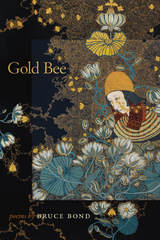
Gold Bee
Bruce Bond
Southern Illinois University Press, 2016
In his collection Gold Bee, Bruce Bond takes his cue from Wallace Stevens’s Harmonium, bringing a finely honed talent to classic poetic questions concerning music, the march of progress, and the relationship between reality and the imagination.
Blending humor and pathos, Bond examines the absurdities of contemporary life: “The modern air so full of phantom wires, / hard to tell the connected from the confused / who yak out loud to their beleaguered angels.” At other times, his intricately crafted lyrics weave together myth and history to explore the various roles music and art play in the human experience, as when Bond’s poems meditate on Orphean themes, descending to the underworld of loneliness, commercialism, or death and emerging with hard (and hard-won) truths.
Addressing broadly ranging topics—from a retelling of the story of Artephius, the fabled father of alchemy, to a meditation on a fashion ad’s wind machine—Bond’s voice is always penetrating in its examination, yet wondering in the face of beauty, conjuring for the reader a world where music has “the power / to move stones, not far, but far enough.”
Blending humor and pathos, Bond examines the absurdities of contemporary life: “The modern air so full of phantom wires, / hard to tell the connected from the confused / who yak out loud to their beleaguered angels.” At other times, his intricately crafted lyrics weave together myth and history to explore the various roles music and art play in the human experience, as when Bond’s poems meditate on Orphean themes, descending to the underworld of loneliness, commercialism, or death and emerging with hard (and hard-won) truths.
Addressing broadly ranging topics—from a retelling of the story of Artephius, the fabled father of alchemy, to a meditation on a fashion ad’s wind machine—Bond’s voice is always penetrating in its examination, yet wondering in the face of beauty, conjuring for the reader a world where music has “the power / to move stones, not far, but far enough.”
[more]
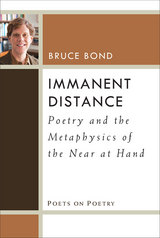
Immanent Distance
Poetry and the Metaphysics of the Near at Hand
Bruce Bond
University of Michigan Press, 2015
In these essays, Bruce Bond interrogates the commonly accepted notion that all poetry since modernism tends toward one of two traditions: that of a more architectural sensibility with its resistance to metaphysics, and that of a latter-day Romantic sensibility, which finds its authority in a metaphysics authenticated by the individual imagination. Poetry, whether self-consciously or not, has always thrived on the paradox of the distant in the immanent and the other in the self; as such, it is driven by both a metaphysical hunger and a resistance to metaphysical certainty. Hidden resources of being animate the language of the near, just as near things beckon from an elusive and inarticulate distance. Bond revalidates the role of poetry and, more broadly, of the poetic imagination as both models for and embodiments of a transfigurative process, an imperfectly mimetic yet ontological engendering of consciousness at the limits of a language that must—if cognizant of its psychological, ethical, and epistemological summons—honor that which lies beyond it.
[more]
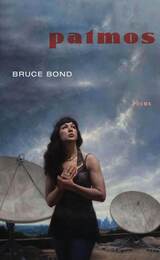
Patmos
Bruce Bond
University of Massachusetts Press, 2021
The dead are never far from the living in Patmos, the end is always nigh, and the cultural symptoms of denial and reconciliation, unresolved shame and loneliness, remain just beneath the surface: "It is how, these many / years, we survived. In our rooms, alone, at the end of time." In this book-length poetic sequence, Bruce Bond explores the psychology of endings as a living presence that haunts our spiritual, moral, and ecological imaginations, elevates its summons, and draws us to question its significance. The horrors and glories in the revelations of John of Patmos provide a lens into a wound, a crisis of values, a longing to heal a visionary brokenness that is fundamentally solitary and yet contemporary, written against a door that will not open.
[more]

Therapon
Bruce Bond and Dan Beacy-Quick
Tupelo Press, 2023
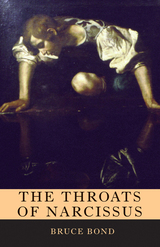
The Throats of Narcissus
Bruce Bond
University of Arkansas Press, 2001
In Bruce Bond's fourth full-length book, The Throats of Narcissus, the myth of Narcissus finds its transfiguring mirror in poems of a contemporary world, a world rendered precarious by literal and metaphysical famine, by the blood of fathers and distant strangers, the charred relics of foreign wars and nearer fires as well—a world wrestling with problems of its own self-regard and the consequent spiritual longing for personal communion and creative transformation. Thus the myth of Narcissus resonates not only as a story of self-absorption and demise, but also of life-affirming metamorphosis. As a result, we see not only poems concerning childhood and the dawn of guilt, desire, and self-awareness, but also poems featuring jazz figures of the fifties and sixties, heroes of creative discipline and play who dealt musically with their own narcissistic wounds and addictions, leaving a generous legacy of pleasures, however rebellious and private their roots.
[more]
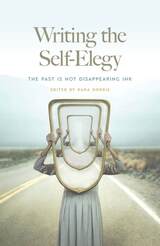
Writing the Self-Elegy
The Past Is Not Disappearing Ink
Edited by Kara Dorris
Southern Illinois University Press, 2023
An innovative roadmap to facing our past and present selves
Honest, aching, and intimate, self-elegies are unique poems focusing on loss rather than death, mourning versions of the self that are forgotten or that never existed. Within their lyrical frame, multiple selves can coexist—wise and naïve, angry and resigned—along with multiple timelines, each possible path stemming from one small choice that both creates new selves and negates potential selves. Giving voice to pain while complicating personal truths, self-elegies are an ideal poetic form for our time, compelling us to question our close-minded certainties, heal divides, and rethink our relation to others.
In Writing the Self-Elegy, poet Kara Dorris introduces us to this prismatic tradition and its potential to forge new worlds. The self-elegies she includes in this anthology mix autobiography and poetics, blending craft with race, gender, sexuality, ability and disability, and place—all of the private and public elements that build individual and social identity. These poems reflect our complicated present while connecting us to our past, acting as lenses for understanding, and defining the self while facilitating reinvention. The twenty-eight poets included in this volume each practice self-elegy differently, realizing the full range of the form. In addition to a short essay that encapsulates the core value of the genre and its structural power, each poet’s contribution concludes with writing prompts that will be an inspiration inside the classroom and out. This is an anthology readers will keep close and share, exemplifying a style of writing that is as playful as it is interrogative and that restores the self in its confrontation with grief.
Honest, aching, and intimate, self-elegies are unique poems focusing on loss rather than death, mourning versions of the self that are forgotten or that never existed. Within their lyrical frame, multiple selves can coexist—wise and naïve, angry and resigned—along with multiple timelines, each possible path stemming from one small choice that both creates new selves and negates potential selves. Giving voice to pain while complicating personal truths, self-elegies are an ideal poetic form for our time, compelling us to question our close-minded certainties, heal divides, and rethink our relation to others.
In Writing the Self-Elegy, poet Kara Dorris introduces us to this prismatic tradition and its potential to forge new worlds. The self-elegies she includes in this anthology mix autobiography and poetics, blending craft with race, gender, sexuality, ability and disability, and place—all of the private and public elements that build individual and social identity. These poems reflect our complicated present while connecting us to our past, acting as lenses for understanding, and defining the self while facilitating reinvention. The twenty-eight poets included in this volume each practice self-elegy differently, realizing the full range of the form. In addition to a short essay that encapsulates the core value of the genre and its structural power, each poet’s contribution concludes with writing prompts that will be an inspiration inside the classroom and out. This is an anthology readers will keep close and share, exemplifying a style of writing that is as playful as it is interrogative and that restores the self in its confrontation with grief.
[more]
READERS
Browse our collection.
PUBLISHERS
See BiblioVault's publisher services.
STUDENT SERVICES
Files for college accessibility offices.
UChicago Accessibility Resources
home | accessibility | search | about | contact us
BiblioVault ® 2001 - 2024
The University of Chicago Press









